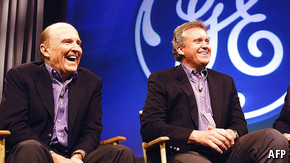Electric shock
An iconic firm abandons its finance business
Apr 10th 2015
.
IT MUST be annoying for Jeff Immelt, the boss of General Electric (GE), when articles about his firm start with a reference to his predecessor, Jack Welch. Mr Immelt has been in charge of the world’s biggest industrial concern for 14 years. His latest move, GE’s exit from its vast finance arm, announced on April 10th, will mean Mr Immelt has changed the firm as dramatically as anyone in its 123-year history. But to understand this landmark in American capitalism—and why investors are so happy about it—you have to start with Jack.
GE’s finance arm is one of America’s largest financial entities, with assets of half a trillion dollars, about the same as Lehman Brothers had in the run-up to the financial crisis of 2008. It does everything from consumer loans to property. It exists because of Mr Welch. When he became the head of GE in 1981, his initial mission was to make an industrial champion fit again, by cutting costs.
His excellence at this task made him the world’s most famous boss, with an attendant cult of personality. But Mr Welch also gradually made two strategic shifts. He wisely made GE a global firm. And he foolishly turned it into a closet bank.
For a long time Mr Welch looked like a visionary. He anticipated America’s giant financial bubble in the 1990s and 2000s. Profits from finance soared for the economy as a whole. And GE’s chosen business model in financial services was as turbo-charged as Mr Welch. Without a big base of deposits it financed itself with debt. It had high leverage and as a result appeared highly profitable. In Mr Welch’s last year in charge, in 2000-01, the finance arm had a return on equity of 23% and contributed 41% of the company’s profits. For all GE’s rhetoric about “six-sigma” factory floor techniques, it was really a giant financial punt.
Perhaps cowed by his predecessor, Mr Immelt showed little inclination to shrink GE’s finance arm when he took over. Its earnings were a form of corporate opium that the firm was addicted to. Then came the financial crisis. Short-term debt markets dried up, making it hard for GE to roll over its $72 billion of commercial paper. Earnings from the finance arm collapsed. The firm received a government bail-out and was forced to cut its dividend. If in its own imagination GE represented a bastion of American strength, the crisis revealed it to be one of the economy’s weaker links.
In the aftermath Mr Immelt recognised that the finance arm had to be shrunk. Its profitability seemed certain to fall after regulators cracked down on short-term lending and demanded that more capital be held as a safety buffer. The initial plan was to cut the contribution of finance from about 40% of GE’s profits to 25%. In 2014 he spun off Synchrony, its consumer-finance arm, to this end.
Mr Immelt’s new plan goes much further: finance will be shrunk to below 10% of profits. He has no doubt decided that the mesh of financial regulation that has grown in the past two years is unmanageable, as many big banks complain is the case. And given GE’s sluggish share-price performance he has been under pressure to make a bold and shareholder-friendly move before he retires. There have even been whispers that an activist investor might seek to dismember GE.
GE’s share price duly rose by almost 10% on the news. Yet there are still two big uncertainties. The first is how easy it will be for GE to wind down its financial arm. Some $27 billion of real estate will be sold, mainly to Blackstone and Wells Fargo, but there are a further $165 billion of assets which need to be wound down or to find a new owner. Regulators will find that the risk embedded in GE today will move elsewhere in the financial system.
The second uncertainty is how strong GE is without its financial-services arm. Mr Immelt is aiming for double-digit annual earnings growth until 2018. But pre-tax profits from GE’s industrial businesses only grew by 3% in the last quarter of 2014, with the lower oil price hurting GE’s energy business.
Still, some things are crystal clear. Once viewed as a way of sexing up a tired industrial firm, financial services are now viewed by investors as a toxic liability. And Mr Immelt has finally stamped his mark on GE, in a way that is damaging for the reputation of Mr Welch.


0 comments:
Publicar un comentario